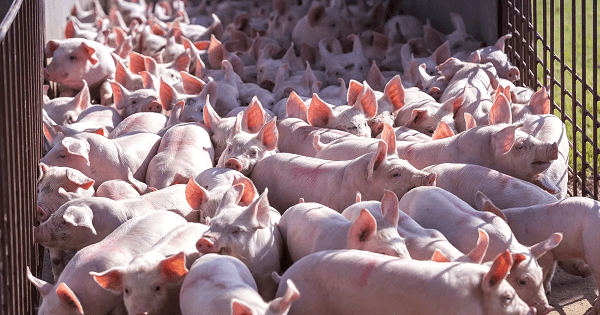Researchers from the Chinese Academy of Sciences have warned that pigs are more infectious to humans and need to be watched closely, to prevent them from spreading infection to humans, which could cause another pandemic.
According to the study published in the US journal, Proceedings of the National Academy of Sciences (PNAS), the researchers have been studying outbreaks of swine flu in pig farms across the country and say the latest strain can pass to humans even though only two people are confirmed to have caught the virus, dubbed G4 EA H1N1, since the first outbreak in 2016.
The experts who say the disease is ‘highly adapted’ to infect humans are now calling for monitoring of farms and people working on or near them as further transmission could cause the virus to ‘adapt and become a pandemic’.
The two cases of a G4-like EA H1N1 virus were of a 46-year-old and a 9-year-old.

‘Epidemiological survey found that the two patients had neighbours who reared pigs, suggesting that G4 EA virus could transmit from swine to human, and lead to severe infection and even death.’
During tests of the virus in ferrets they found symptoms such as fever, sneezing, wheezing, and coughing were all common.
George Gao, Jinhua Liu, and colleagues isolated 179 viruses from pigs across 10 provinces in China from 2011 to 2018 to study the risks they pose to humans and found that since 2016 the majority of viruses found in farmed pigs exhibited features you’d expect from the populace during a pandemic.
According to the scientists, out of 300 samples taken from pig farmers on 15 different pig farms, only 10.4 per cent had antibodies against this strain of the virus.
This means the virus poses a particularly strong chance of pandemic spread according to the scientists.
‘All of this evidence indicates that G4 EA H1N1 virus is a growing problem in pig farms, and the widespread circulation of G4 viruses in pigs inevitably increases their exposure to humans,’ study authors wrote in their paper.
The novel coronavirus that caused the COVID-19 pandemic is believed to have originated in horseshoe bats in southwest China, and could have spread to humans via a seafood market in Wuhan, where the virus was first identified.
The PNAS study revealed that igs are considered important “mixing vessels” for the generation of pandemic influenza viruses and called for “systematic surveillance” of the problem.
China took action against an outbreak of avian H1N1 in 2009, restricting incoming flights from affected countries and putting tens of thousands of people into quarantine.
The new virus identified in the study is a recombination of the 2009 H1N1 variant and a once prevalent strain found in pigs.
But while it is capable of infecting humans, there is no imminent risk of a new pandemic, said Carl Bergstrom, a biologist at the University of Washington.
“There’s no evidence that G4 is circulating in humans, despite five years of extensive exposure,” he said on Twitter after the paper’s publication. “That’s the key context to keep in mind.”










